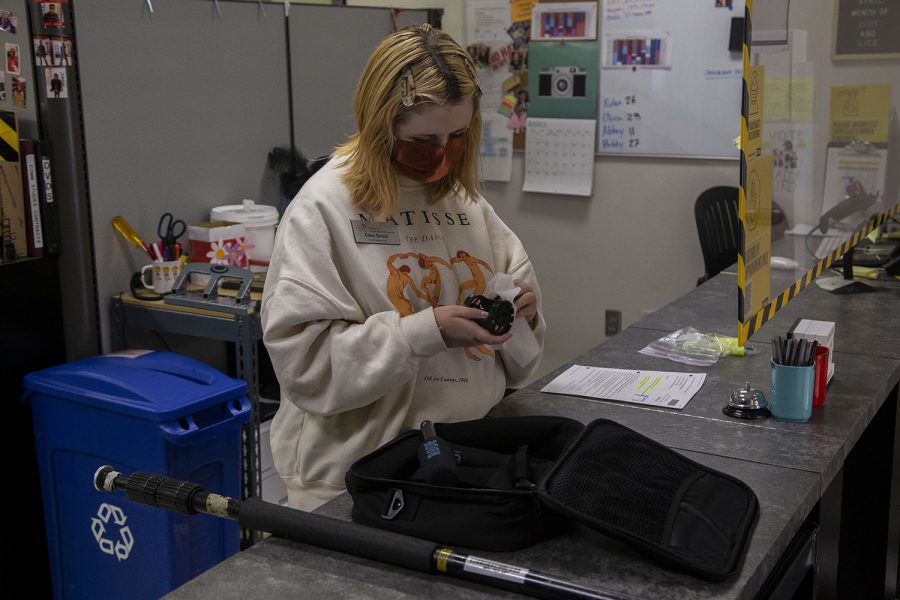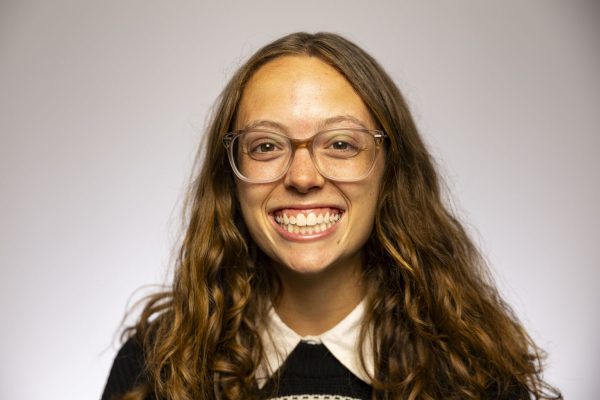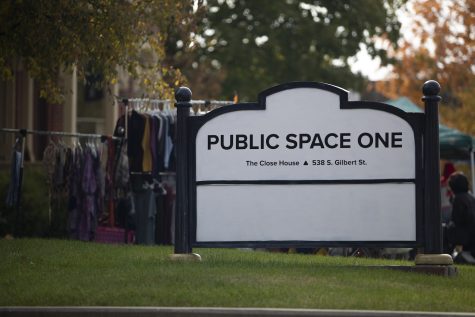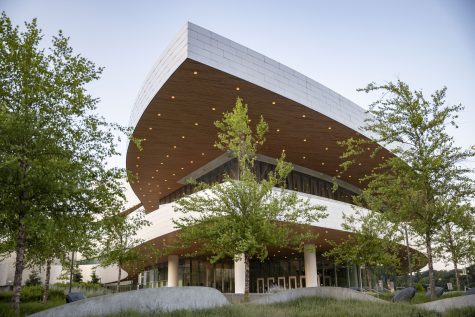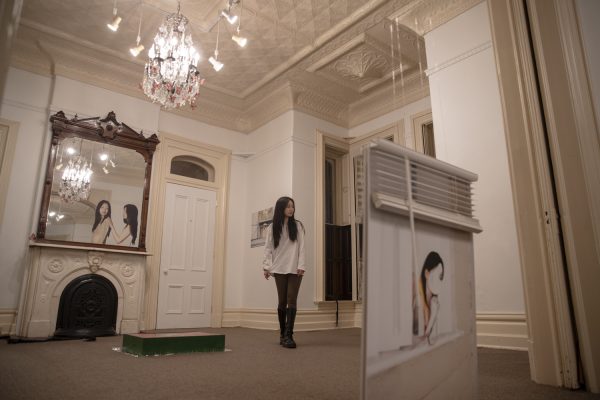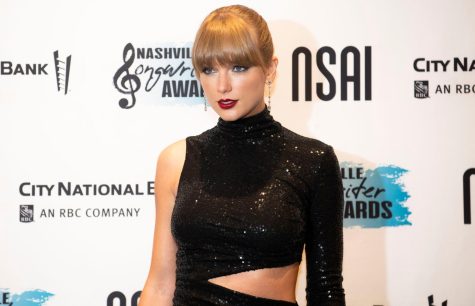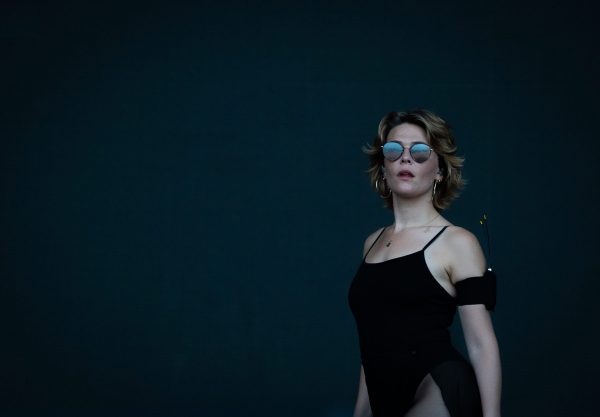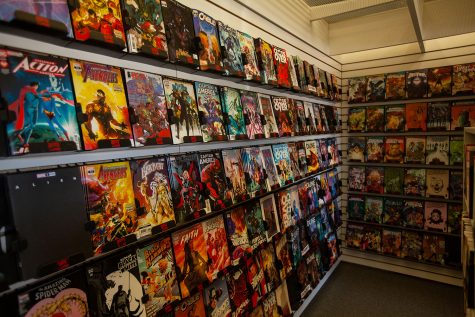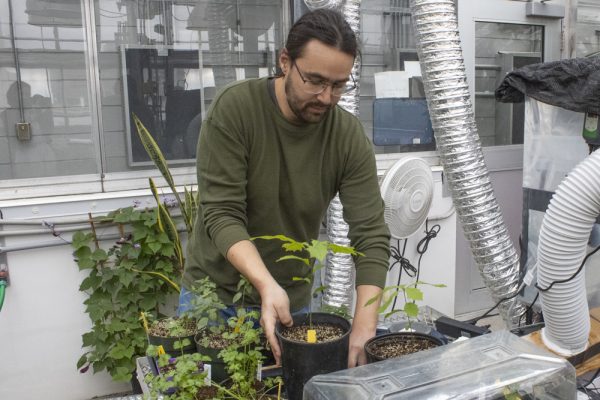Life at Iowa: Students behind the scenes in creative fields share how pandemic affected their jobs
UI students share how their jobs on the art scene on campus have been affected by the pandemic.
Senior and journalism major, Eden Smith, cleans equipment after a student returns it in Equipment Checkout located in the Becker Communication Studies Building at the University of Iowa on Wednesday, March 31, 2021. (Grace Smith/The Daily Iowan)
April 5, 2021
A year into the pandemic, employees have been asked to take furloughed time, transition to an online work environment, and must take extra steps to protect themselves from the virus at work. Those who work behind the scenes in the creative world at the University of Iowa are no exception.
UI sophomore Maggie Bashore began painting sets for the Theatre Department as a freshman. She attended a campus job fair in 2019, where she first heard about the gig. Bashore painted as a hobby in high school and needed a job, so it fit, she said.
“I really liked that job,” Bashore said. “I get paid, but I also go there to relax. It’s my time to go do art for the week, and I’m really lucky that I get paid to do that. It’s kind of my happy place.”
Bashore said prior to the pandemic she’d hoped to work more hours at the Theatre Department this year. Instead, her hours were cut significantly because of fewer shows, forcing her to search for a second job in addition to painting. But Bashore’s loss is more than monetary — she misses her creative outlet.
“I’m looking for another job right now, which is really stressful because I’m super busy with an unpaid internship and student orgs at the same time, so having to get a second job on top of that and online school seems kind of impossible, but I have to,” she said.
Bashore said despite her manager’s best efforts to give her more hours, it’s not enough. The Theatre Department’s filming schedule is time more consuming than putting on live shows, she said, which has prevented the department from doing as many full, on-stage productions as usual and added more “dead space” between each show in need of a set.
Bashore’s job isn’t the only one that’s lost — hopefully temporarily — some of its more enjoyable elements.
Eden Smith, a senior who spent two and a half years working at the equipment checkout station in the Becker Communications building, said her job has also changed.
“We’re doing the best we can, but there’s only so much we can do with COVID to make it feel like it did before,” she said.
Her and her coworkers often bring in food to celebrate birthdays and holidays, she said, illustrating how close the tight-knit group had become. While she still describes her work environment as positive, she said pandemic safety precautions created a sense of distance — metaphorically and literally.
RELATED: Life at Iowa: How UI students spent their first wellness day
Where there used to be long lines of film and journalism students, there’s — for now — a relatively empty room equipped with cleaning supplies and plexiglass. A socially distanced worker checks out or returns equipment to one student at a time, while others thoroughly clean their cameras and microphones.
Students who don’t need advanced equipment are able to check out equipment for the whole semester, unlike in previous years, but advanced film students can’t do the same because the gear they need is limited and expensive.
All aspects of art have felt the blow of the pandemic and I, as an arts reporter at The Daily Iowan, also have witnessed a drastic change in my reporting. Art, theater, film, and all other art affected by the pandemic also changes my job. Reporting on the arts and culture scene this year means covering venues closing, artists making difficult and unwanted changes to the ways their art is produced, and people struggling to find work. While I still try to focus on the triumphs of art-makers, the arts have undoubtedly suffered exponential losses during the pandemic. The COVID-19 questions always have to be asked in my interviews. The work and the people are noticeably less joyful than my reporting last year.
While I’m thankful that there’s still art being created — even in a limited capacity — I miss speaking to artists who don’t have to make concessions in their art because of the pandemic. I also miss talking with these artists in person, where our conversations felt more, well, personal.
I hope we can all return to witnessing talented Iowa artists in-person, and soon.



